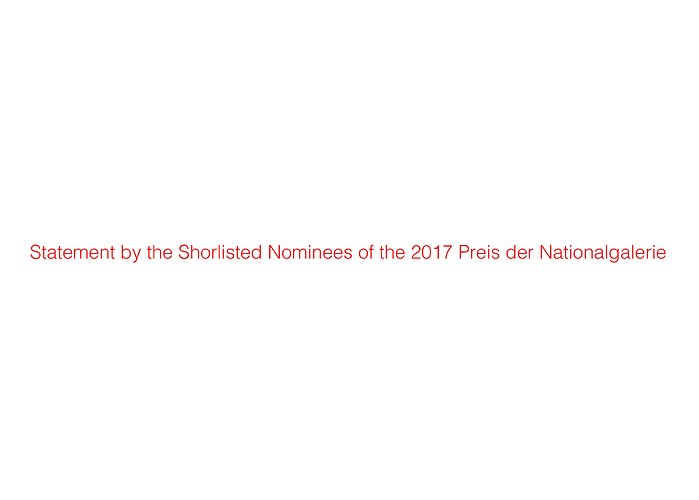November 9, 2017
As the four shortlisted nominees for the Preis der Nationalgalerie, we have decided to release a joint statement concerning our experience. Our statement is a means to highlight and recommend changes to three problematic aspects of the prize, which we find indicative of broader and growing trends in the art field and therefore deserving of a public ear.
I.
The Preis der Nationalgalerie, hosted by the Hamburger Bahnhof – Museum für Gegenwart – Berlin, is a joint venture between the Nationalgalerie of the Staatliche Museen and Freunde der Nationalgalerie, with BMW as its main sponsor. We take, at face value, the intention of this prize to be to support and give voice to serious artistic positions and practices based in Germany.
With this in mind, we have been troubled by the constant emphasis, in press releases and public speeches, on our gender and nationalities, rather than on the content of our work. It is clear to us that in a more egalitarian world, the fact of our gender and national origin would be barely noticed. Having it constantly emphasized can only be indicative of how far we are from such an egalitarian world. Furthermore, the self-congratulatory use of diversity as a public-relations tool risks masking the very serious systemic inequalities that continue to persist at all levels of our field.
We would like to stress that commitments to diversity in gender, race, and experience need to be built into the everyday operations of institutions and organizations rather than celebrated occasionally at high-profile events.
II.
The award ceremony for the Preis der Nationalgalerie seemed to be more of a celebration of the sponsors and institutions than a moment to engage with the artists and their works. The award was announced at the end of numerous speeches and performances, in what can only be described as a great unveiling. A solution to this would be to announce the winner prior to the ceremony and let the ceremony be a chance to celebrate and give voice to the winning artist and engage with their practice.
Some conventions, which might function in the corporate world and entertainment industries, seem out of place when applied to the field of art. The award does not need to be structured in a manner that implies a sense of competition between people who are not in fact competing. Structuring it in this manner results in the creation of obstacles to solidarity, collectivity, and mutual support among artists.
III.
We believe that all exhibitions, including the exhibitions of the shortlisted nominees, should include an artist fee. Furthermore, artist talks, panels, and public discussions should also include fees. Artists contribute greatly to the prestige of this prize, and their labor, like all forms of labor, needs to be compensated proportionately.
The fact that the Preis der Nationalgalerie does not have a monetary value, and that the exhibitions and public talks of its nominees do not include fees, means that artists are rewarded only with the promise of exposure. There is an unspoken assumption that the participants are likely to be remunerated by the market as a result of being nominated for or winning the prize. As artists, we know this is not always the case. The logic of artists working for exposure feeds directly into the normalization of the unregulated pay structures ubiquitous in the art field, as well as into the expansion of the power of the commercial sector over all aspects of the field.
Lastly, we welcome discussion on these issues from the museum, its friends and sponsors, and all relevant stakeholders, including past nominees, in the hope that together we can improve the situation for future iterations of the prize. We hope that this discussion might be useful as a model for considering other similar events in the field of art.
—Sol Calero, Iman Issa, Jumana Manna, and Agnieszka Polska
